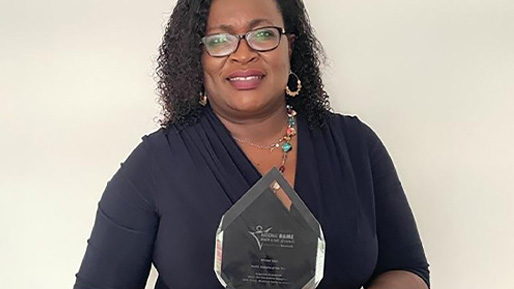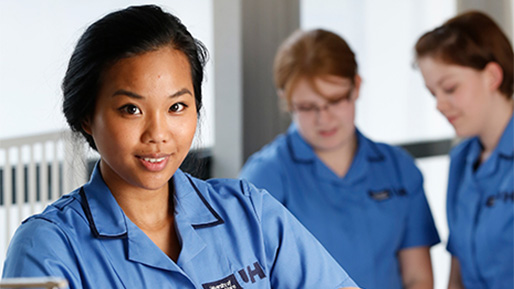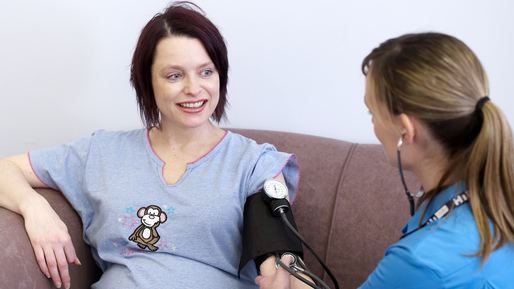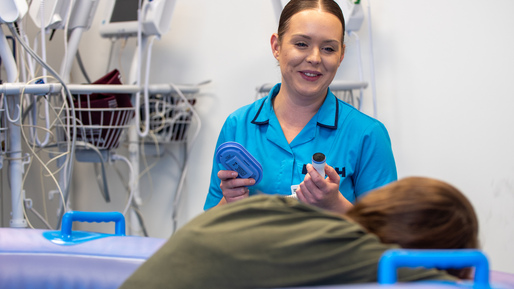
BSc (Hons) Midwifery (Pre-registration)
Gain the knowledge, skills, and compassion to make a difference in mothers' and babies' lives. Become a confident, competent midwife and leave a lasting impact on families and communities.
-
Typical offer: 120–128
Entry requirements -
Fees: £9,535 per year (UK)
Full details -
UCAS code: B720
-
Course length: Full time: three years
Find out more -
Location:
- University of Hertfordshire, Hatfield
-
Institute code: H36
The Janice Ann McNaughton Bursary
£3,000 (paid in the first year of study) is awarded every year to two first year students studying on this course. Students are eligible to apply if they are care-leavers or care-experienced students aged 18-24. If the cohort does not include two students who meet the above criteria, students under the age of 25 who are the first in their family to attend university may be considered.Applicants must fill in a short application form.
NHS Learning Support Fund
Training grants of at least £5,000 a year are available for eligible healthcare students which you will not have to pay back. You may also be eligible for an additional £2,000 towards childcare costs to help balance your studies with family life and £3,000 for students who find themselves in unforeseen financial hardship.
Course overview
Midwives provide essential care during pregnancy, labour and the postnatal period to both mothers and their babies. On this midwifery course, you’ll gain sound knowledge of what's normal and healthy in childbearing women and recognise and manage any problems that may arise. You’ll learn how to perform examinations on the mothers-to-be as well as their infants after birth. Alongside studying the theory of midwifery, half of your time will be spent in various clinical settings partnering with experienced midwives.
Why choose this course?
We have an excellent reputation and will help you to develop the qualities needed that define a University of Hertfordshire graduate midwife. With the BSc (Hons) Midwifery course you gain sound midwifery knowledge of normality, enabling you to become competent in recognising and managing deviations from this normality.
You will benefit from the inclusion of the Newborn and Infant Physical Examination (NIPE) competency, which provides you with advanced knowledge to support the care provided. The BSc Preg Registration Midwifery course is UNICEF UK Baby Friendly Accredited,which supports best practices concerning infant feeding and relationship building.
In addition to university study skills support, lecturers also provide close guidance to students both in the university and in practice. The University is ranked 7th in the UK for both learning opportunities and organisation and management for nursing and midwifery (National Student Survey, 2024).
Professional accreditations
When you successfully complete the BSc (Hons) Midwifery course, you can apply for registration with the Nursing and Midwifery Council, the regulatory body governing Midwifery practice in the UK. It is necessary to register in order to practice as a midwife in the UK.
Your future career
This course will lay the foundation for your continuing personal and professional development throughout your career, with opportunities when you graduate for post-qualification study at masters and doctoral level.
100% of graduates are in work or doing further study 15 months after the course (Graduate Outcomes, 2019/2020).
See what recent graduates are up to

Angelina Ankomah
Diabetic Specialist Midwife at West Hertfordshire Hospitals NHS Trust
Meet Angelina Ankomah, Black, Asian and Minority Ethnic Midwife of the Year award winner with a passion for helping people
Award-winning midwife Angelina Ankomah (BSc (Hons) Midwifery, 2006) has made a huge impact in society since completing her degree at the University's School of Health and Social Work. This culminated in her being named Black, Asian and Minority Ethnic Midwife of the Year at the 2021 National Black, Asian and Minority Ethnic Health & Care Awards.
The awards recognise and celebrate the achievements of Black, Asian and minority ethnic staff across health and care services, including exceptional initiatives and leadership, and the improvement of services, for people from Black, Asian and Minority Ethnic communities. Angelina was originally shortlisted along with three other midwives from around the country and the judges were highly impressed by her commitment, dedication and inspiring leadership.
Speaking at the time about the award, West Hertfordshire Hospitals NHS Trust's Chief Nurse, Tracey Carter said, 'We are delighted that Angelina has won the ‘Black, Asian and Minority Ethnic Midwife of the Year award 2021’ and that her outstanding contribution to the maternity diabetes service has been recognised. Her leadership, compassion and commitment has improved care and outcomes for so many of our diabetic mothers.'
A passion for nursing
Looking back on her career, Angelina's dream was to become an accountant and work in the City but she was encouraged by her family to go into nursing. It turned out to be fantastic advice as she discovered nursing was her true passion. Angelina tells us her story,
‘I started work as a Health Care Assistant (HCA) on an elderly care ward, which helped me to understand the practice of care within the health profession. I realised that I loved caring for people and supporting them through their journey to good health. I decided to study for a Diploma in Adult Nursing at the University of Hertfordshire in 1999 and this initiated my professional nursing career. ‘
Studying at Herts
Angelina returned to the University in 2004 to study for her BSc (Hons) in Midwifery and qualified in 2006. She looks back on her time at Herts with great pride and fondness,
‘My experience at Herts was exceptional as the lecturers were extremely encouraging and supported me to excel in my academic work to achieve my potential. I have great memories of my time there as it was an environment where I built lifelong friendships.
My fellow students really made it a memorable experience for me as they helped motivate me and were always supportive. Group sessions were very stimulating and engaging; reflecting brings back fond memories of some of the exciting debates we got into as we did our coursework.
The social side of the university was fun, but I can’t comment about the nightlife as I had a two-year old at home during that time! Nevertheless, I had a fantastic time whilst studying there.’
Life after Herts
After graduating in 2006 Angelina joined the Midwifery Department of Watford General Hospital where she started off as a junior midwife, working in all areas of midwifery and then finally settling in the labour ward. Her desire to expand her knowledge saw her take on further learning including qualifications in Management of Complex Pregnancies and Management of Diabetes in Pregnancy that eventually led to her current role as a Diabetic Specialist Midwife at Watford General Hospital.
She has also been a guest lecturer here at Herts, teaching midwifery students in the management of diabetes in pregnancy.
Charity work
Angelina is a core team member of The TRIO Bridge Foundation, a UK registered charity focused on the promotion of a holistic and evidence based approach to healthcare provision in developing countries and within Black, Asian and Minority Ethnic communities in the UK.
TRIO-Bridge also works in partnership with selected Black, Asian and Minority Ethnic Nurses Associations in the UK, aiming to bridge cultural and communication barriers. Covid-19 restrictions redirected training methods and as a result, Angelina is now working on a project to assist in pre-health service areas including strengthening faculty, skills development and improving ICT systems to selected health institutions in Ghana.
The future
When talking about her next steps in her career Angelina says,
‘At the moment, my role is a very busy one, but I enjoy it. Following my recent Black, Asian and Minority Ethnic Midwife of the Year award there has been a lot of interest in my work, from contributing to magazines to speaking at midwifery conferences.
I would like to have more speaking opportunities at academic institutions, to motivate young Black, Asian and Minority Ethnic students to pursue options in nursing and midwifery as a career path to serve their community.’
Words of advice
Our conversation with Angelina finishes on a very positive note as she concludes,
‘I remember as a junior nursing student, during my first day at nursing college, an Irish lecturer encouraged us to give our best to our patients. She told us to always be mindful that the patients for whom we provide care for could be our sister, brother, friend, or uncle, and that they are an extension of us.
This has stayed with me throughout my career, and I have no doubt that following that advice contributed to me being nominated and subsequently winning the Black, Asian and Minority Ethnic Midwife of the Year 2021.’
If you have an inspiring story like Angelina's please get in touch with us at the Alumni Office.

Sophie Wilkins
Community Midwife at The Royal Free Hospital
Meet Sophie Wilkins whose desire to help people has led her into a career as a midwife
With a mother and sister both working in the NHS, Sophie was inspired by hearing their stories about how rewarding a career in healthcare can be. Coupled with a strong desire to help people she was led to midwifery and Herts.
Talking about why she chose midwifery Sophie says, ‘The journey to motherhood and beyond is so inspiring, and it feels wonderful to be part of a profession involved in such a pivotal moment in peoples’ lives.’
Having qualified in September 2020, during the pandemic, Sophie started work as a Band 6 Midwife at The Royal Free Hospital on their labour ward. This role entailed supporting women during labour, and facilitating births, in a range of low-risk and high-risk settings.
She has now moved into a role as a community midwife, working at Edgware Birth Centre. Sophie says, ‘In this role I have a caseload of approximately 36 pregnant women of whom I provide, and co-ordinate, their antenatal care. I also see women within our community area once they’ve had their baby - providing feeding support and general postnatal care. It really is a fantastic role!
Study at Herts
When it comes to why she decided to study at Herts, Sophie says a variety of factors were pivotal in her decision.
‘Herts is a very forward-thinking University, and one of the only providers in England to include The Newborn Infant Physical Examination qualification within their degree. Whilst I was very keen to apply, I visited for an Open Day before I did, and I absolutely loved the feel of the campus and the warm welcome I received from the midwifery team. It really did compound my decision that Herts was the place I wanted to study!’
Expert help
Looking back on her time at Herts and how the course has helped with her career Sophie says,
‘The best thing about the course was the incredible knowledge of the midwifery lecturers. They all came from highly decorated clinical careers, with some even continuing to work in an acute hospital setting. It also meant the pastoral support received from them was exceptional - they all understood the pressures we faced whilst on clinical placement.
This unwavering support helped build my confidence and shape me into the midwife I am today. My personal tutor, Bernie Nipper, fuelled a passion in me to always have the woman, and her family, at the heart of what I do.’
Peer support
With an emphasis on support from both lecturers and students it's no surprise that Sophie has such strong memories of her time at Herts.
'My favourite memory of Herts is definitely the friends for life I have made on the course. The journey to becoming a midwife is like a rollercoaster, with incredible highs such as witnessing your first ever birth, to sombre lows when supporting bereaved families. It is during these three years that Herts provided the safe space to talk, process and support one another. I am so proud of all the Herts Midwifery students and I feel privileged to have graduated alongside them.'
'My fellow student and best friend was Chair of the Herts Midwifery Society - this provided us with fantastic learning opportunities. One of my favourites was a study day run by a fantastic organisation called 'Positive about Down Syndrome'.
The future
Sophie is very proud of the fact that in June of 2021 her third year literature review was published in MIDIRS, an academic midwifery publication. She is very much concentrating on the now, especially as the pandemic has such implications in healthcare and says,
'Whilst the COVID pandemic continues, my role as a community midwife is more important than ever. But most excitingly, I now have the opportunity to mentor new Herts midwifery students who are coming out on their clinical placement and give back to the University that gave me so much.'
What you'll study
The midwifery degree will see you spending 50% of your time on campus where you’ll build your theoretical knowledge in lectures, seminars, tutorials and laboratories.
You will strengthen your ability for self-directed study and further your interpersonal skills. You’ll also develop your writing, presentations and computer literacy skills through case studies, individual and group projects and other student-centred activities.
In your first year, we’ll start you right from the beginning. You’ll explore a woman’s journey into motherhood. You’ll understand the well-being of the childbearing woman from antenatal to the postnatal period. You’ll see the importance of working as part of one multi-professional group to help a new parent make informed pregnancy and birthing choices.
In your second year, you will get to explore social and cultural aspects to consider in midwifery in more detail. You will also look at disorders of body systems, medical conditions caused by pregnancy and breastfeeding conditions and challenges. At the end of the second year, you will also have the opportunity to undertake an elective placement. If you choose this option, you will get to spend three weeks in a different midwifery setting either in the UK or abroad.
In your final year, you’ll find that you have grown to love certain topics that you just need to learn more about. For example, this could be the parent-baby attachment or how culture or religion affects the neonatal care you give to new mothers. It’s up to you to decide what you want to focus your final literature review on.
What if I need support?
You’ll get a personal tutor to guide you through your course and you will also have a student buddy to help you when needed. Additionally, all our sites have practice education facilitators with who we work closely, they will support you in practice in addition to lecturers.
You might also want or need extra support during your time with us. Rest assured, no matter what you study, we’ve got you covered. For help with study skills, including referencing, essay writing and presentations, you’ll have access to our academic support services. You can attend workshops, 1-to-1 sessions and online tutorials. Both our LRCs run drop-in study skills sessions. And the best thing is, it’s all free.
Where you'll study
You’ll share College Lane campus with future nurses, scientists, artists and more. You can use the common rooms to relax with friends, work out in the 24-hour gym or have a drink in our on-campus bar or cafes. We also have restaurants for you to eat in or grab something on the go. Our Learning Resources Centres are open 24/7, which means you can study whenever suits you best. Want to pop over to the other campus? You can take the free shuttle bus or walk there in just 15 minutes.
Check out our student blogs
How we support our students
At the University of Hertfordshire, we want to make sure your time studying with us is as stress-free and rewarding as possible.
We offer a range of support services, from childcare to counselling, ensuring that you make the most of your time at Herts and can focus on studying, having fun, and have the support you need.

Student Blogs
Alina - Week at a glance
My week at a glance
Hello everyone! My name is Alina and I am in my first year of the Midwifery course. In this blog, I will tell you the few common things that I do every week when I’m at uni.
I always start my week by planning what I will be doing that specific week. I have a planner that I keep which helps me remember the things that I need to do. I write deadlines, duties that I must fulfil and other personal responsibilities.
Before lectures, I try to remind myself of the topic that will be discussed at that lecture so that I will be bringing the right things to the lecture.
Soon after each lecture, I tend to visit the Learning Resource Centre (LRC) and go over the lecture again in my own time to make sure I understand everything discussed in that lecture. I like to draw diagrams, print pictures and use many colours when taking notes. I have noticed that this is a very effective way of learning for me.
During placement weeks, I ensure I have the right things with me in the hospital, such as a note pad, a stethoscope, and a pen. Taking notes whilst on placement has aided my visual learning, as whenever I am shown something new, I find that writing it down helps to build and reinforce my understanding.
Aside from the compulsory lectures and placement, I try to do other activities within the University. I occasionally play volleyball and recently joined the Student Ambassador community. The midwifery course isn’t entirely easy, and therefore it is very important to find some time for yourself to go out with friends and do what you love to do.
While university life may sound scary to many of you, if you have the right people next to you, encouraging you to keep going, you can have an amazing time studying a subject that you love. Therefore, I encourage all of you to make friends, join communities outside your course and be open to other opportunities. The University also has so much support available to all their students, so if you ever need some advice and support the student support centre and your school of study will be happy to lead you in the right direction.
I wish you all the best of luck!

Student Blogs
Alina - Things you should know
Things you need to know before studying Midwifery at Herts
You probably think that reading is essential to gain the knowledge of midwifery, and yes, this is partly true, however, the university provides many practical resources and opportunities for you to gain the skills and knowledge of midwifery as well as theory. To be completely honest, I didn’t know much information about midwifery before starting my course and now that my first year is almost over, I can tell you a few tips to enhance your knowledge of midwifery before starting the course.
Getting to know what midwifery is about
Before starting your course, you might find it useful to read about what the course is about, however you would have to find out what midwifery is about. There are some books which can help you get started. Reading about midwifery will make your life at university easier as they will not only inform you of what midwifery is about beforehand but also help you with your assignments and knowledge throughout your 3-year course. It is always helpful to ask the university what the course consists of and what to expect from it.
Commitment
Midwifery is a complex course, however, the outcome of it is worth it. This course will require commitment, there will be moments when you will have to give up a night out to finish an assignment or cancel plans due to change in your timetable. As this course provides 50% theory and 50% placement, good time management is essential. You will have to make sure you’re not absent and not late as it can affect your learning.
Assessments
When studying midwifery there are different ways you will be assessed. Aside from being assessed on your knowledge of the theory you’ve been taught; you will also be assessed on your performance and skills in placement. There is no need for you to be worried about that now because everything will be easier to understand as you start your course. There is plenty of support available for you regarding any aspect of your course and anyone at the university will be happy to help you.
Independence
Studying midwifery will require a lot of independent work. You will be required to plan your time wisely to meet deadlines and avoid stressful situations. To help you organise your time better I recommend that you buy a diary where you can write your plans for the days and weeks to come. Making friends from your cohort can be very helpful as well. Yes, university life can get stressful at times, but you must ask for help when you need it.

Student Blogs
Alina - Why I chose Herts
Why I chose Herts
Hi! My name is Alina and I am going into my second year of studying midwifery at the University of Hertfordshire. Before applying to universities last year, I used to live in North-West London with my family, therefore I applied to the universities closer to home. After being accepted at the University of Hertfordshire my family decided to buy a house in Northampton which meant that I had to commute from Northampton, live in halls or rent private accommodation in Hatfield. I went with the third option. This year I have had the opportunity to see what’s it like to live with other students and how it is to take my life into my own hands.
Before studying at Herts, I studied a two year BTEC Health and Social Care course in London. During this time, I have had the opportunity to study different areas of health and social work. The decision to study midwifery was spontaneous and it the best decision I have made so far. The University of Hertfordshire is a great place for those who want to study midwifery. I remember the interview at Herts took place in a building where practical lectures usually took place. This is when I saw how many different learning resources the university can provide to its students.
The facilities of the university are amazing. Not only does it have 24/7 Learning Resource Centre (LRC) access and support available but also the quality of the food served as well as other advanced facilities have been an influence towards my decision to choose Herts as the university, I would like study at.
Moving away from home isn’t easy, I have struggled at the beginning but the support I received was very helpful. For those who want to move into halls or other accommodation, I advise you not to panic. The idea of moving from home may sound scary but if you try to enjoy it, you will realize that it is not as scary as you thought it would be.
Thank you for reading this, good luck!
Entry requirements
The University of Hertfordshire is committed to welcoming students with a wide range of qualifications and levels of experience. The entry requirements listed on the course pages provide a guide to the minimum level of qualifications needed to study each course. However, we have a flexible approach to admissions and each application will be considered on an individual basis.
| Typical offer (UCAS points) | 120–128 |
|---|---|
| Typical A Level offer | BBB–ABB: including at least grade B in a Biological or Behavioural/Social Science. |
| Typical IB offer | 120–128 points from a minimum of one HL at grade 5 or above in a biological or behavioural/social science and one HL subject at a grade 4 or above (with the remaining points to come from a combination of HL, SL and Core). |
| Typical BTEC offer | DDM: in Applied Science or Health related subject. |
| Accepted T Level offer | Healthcare science (B required in core component); Health (B required in core component ); Science (B required in core component) |
| Access courses | Access to Nursing and Midwifery, Health Professions or similarly named course - students must achieve a minimum of 30 Distinctions at Level 3 and the remainder at Merit. |
| GCSE | Grade 4/C in English language, mathematics and science. |
| Interview | Once you have applied via UCAS, you may then be invited for an interview. The face-to-face interview involves a group workshop and multiple mini interviews over the course of half a day. Tutors want to see your passion and enthusiasm for the career and an understanding of what being a midwife entails. |
| Additional Information | We do request that applicants have (normally) undertaken some form of formal study within the last five years. All offers will be subject to the applicant's demonstration of the NHS constitution’s “Values and Behaviours”, satisfactory interview, occupational health screening and the Disclosure and Barring Services (DBS) checks. You can view the full NHS Constitution for England on the Government website. All applicants will be subject to fraud and Enhanced Disclosure and Barring Service (DBS) checks and Occupational Health (OH) Screening on commencement of the programme. |
| English language | All students from non-majority English speaking countries require proof of English language proficiency, equivalent to an overall IELTS score of 6.0 with a minimum of 5.5 in each band. If you do not have the required IELTS or equivalent for direct entry on to your degree programme, our Pre-sessional English and International Foundation courses can help you to achieve this level. |
|---|---|
| Additional information | Find out more about International Entry Requirements. |
Ready to apply?
UK and EU applicants with pre-settled/settled status in the UK
| Start date | Study type | Apply |
|---|---|---|
| September 2025 | Full time | Apply via UCAS |
International and EU applicants without pre-settled status in the UK
Fees and funding
At Herts, we’re dedicated to providing world-class teaching supported by industry-level facilities and incredible social spaces. We believe cost shouldn’t be a barrier to higher education, and we strive to keep both our standard and additional costs as low as possible.
NHS Learning Support Fund
Training grants of at least £5,000 a year are available for eligible healthcare students which you will not have to pay back. You may also be eligible for an additional £2,000 towards childcare costs to help balance your studies with family life and £3,000 for students who find themselves in unforeseen financial hardship.
Find out more about the NHS Learning Support Fund
NHS Funding for UK/EU Students
Students studying on nursing, midwifery or allied health professional courses funded by Health Education England will have access to the same student loans support package and support for living costs as other students.
You could also benefit from the NHS learning support fund if you study an eligible nursing, midwifery, or allied health course. If eligible, the different kinds of support you could get include a training grant, parental support, money back for travel and temporary accommodation whilst on placement, and financial hardship (which you won’t need to pay back).
| Study type | Fees | |
|---|---|---|
| UK students | Full time | £9,535 for the 2025/2026 academic year |
| EU students | Full time | £18,280 for the 2025/2026 academic year |
| International students | Full time | £18,280 for the 2025/2026 academic year |
Tuition fees are charged annually. The fees quoted above are for the specified year(s) only. Fees may be higher in future years, for both new and continuing students. Please see the University’s Fees and Finance Policy (and in particular the section headed “When tuition fees change”), for further information about when and by how much the University may increase its fees for future years.
| Scholarships, grants and bursaries | Depending on your circumstances, you may be eligible for a non-repayable scholarship, grant or bursary to support your studies. |
|---|---|
| Disabled Students' Allowance | The Disabled Students’ Allowance can cover any study-related costs you have because of a mental health problem, long term illness or any other disability. |
| Student loans | Find out about securing a student loan, from how much you could be eligible for to when you need to start making repayments. |
| Accommodation costs | We offer a great choice of student accommodation, on campus or nearby in the local area, to suit every student budget. |
| Additional course fees | Read more about additional fees in the course fact sheet. |
More about the course
| Course fact sheets | |
|---|---|
| BSc (Hons) Midwifery (Pre-registration) | Download PDF |
| Programme specifications | |
|---|---|
| BSc (Hons) Midwifery (Pre-registration) | Download PDF |
| Additional information | |
|---|---|
|
Applications open to international and EU students |
Yes |
Course length |
Full Time, 3 Years |


